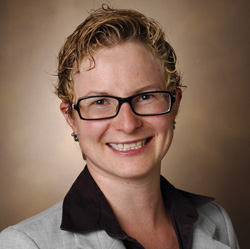Eckstrand to chair AAMC committee
Vanderbilt University School of Medicine student Kristen Eckstrand has been named chair of the Association of American Medical Colleges’ Lesbian, Gay, Bisexual, Transgender and Intersex (LGBTI) Patient Care Advisory Committee.

Kristen Eckstrand
Eckstrand, who is pursuing a dual M.D./Ph.D. degree through the Medical Scientist Training Program at Vanderbilt, was also recently named co-chair of the Vanderbilt Program for LGBTI Health within the VUSM Office for Diversity.
As chair of the AAMC committee, Eckstrand will work with faculty from medical programs across the country to guide the development of medical school curricula in the area of LGBTI health.
“Our goal is to develop the general competencies that all medical students and residents must meet to demonstrate the knowledge, skills and attitudes necessary to interact with, and care for, the LGBTI community,” Eckstrand said, adding that she was selected for the position for her ongoing work with the LGBTI curriculum at VUSM.
In addition to her work revising current medical school curricula, Eckstrand and her co-chair for the Program for LGBTI Health, Jesse Ehrenfeld, M.D., will begin co-teaching a month-long immersion course as part of VUSM’s new curriculum titled “Sex, Sexuality and Sexual Health.”
She has presented Vanderbilt’s ongoing work in integrating LGBTI health care into undergraduate medical education at several national conferences, including the 2011 AAMC Annual Meeting and Leadership Session. Vanderbilt recognized these achievements by awarding Eckstrand the 2011 Levi Watkins Jr. Student Award for Diversity.
Eckstrand also participated in the White House LGBT Conference on Health in 2011, where she and Ehrenfeld met with senior leadership from the U.S. Department of Health and Human Services Health Resources and Services Administration (HRSA), the National Institutes of Health and the White House to discuss disparities in health care access and outcomes experienced by sexual and gender minorities, including the gaps in research, education and patient care.













